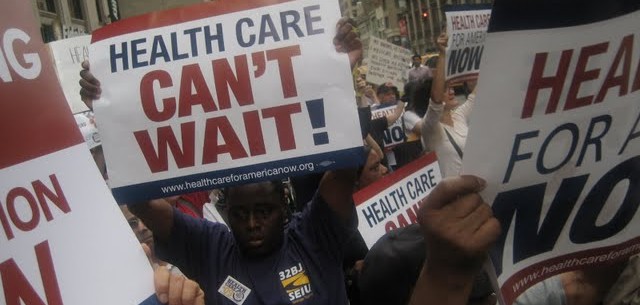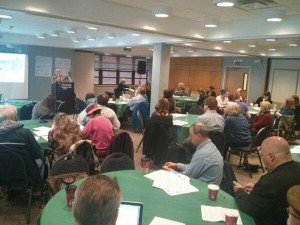Now that the state budget process has concluded for 2014 and the Easter-Passover holidays have passed, progressive political activists of various stripes gathered in Albany on April 30 to share updates and plan mutual strategies through this year. The gathering, dubbed “Going on the Offense for an America and New York that Works for All of Us”, was jointly sponsored by the Restore the American Promise (RAP) campaign and the All of Us campaign. Both are two statewide efforts focusing on budget advocacy at the federal and state levels as they affect health, human service, and workers’ rights issues.
The meeting began with some background on each campaign. RAP was launched in 2011, initially to protect major national social programs like Social Security, Medicare, Medicaid, and Food Stamps during the federal debt ceiling fight of that summer. Since then, it has broadened its agenda to include related strategic issues such as restoring tax fairness, promoting economic recovery and job growth, and countering an overall “politics of austerity” that has dominated much of American politics since the advent of the Great Recession. The All of Us campaign was launched in the Spring of 2013 in response to political gridlock in the New York State Senate that stopped many major progressive issues from being taken up in the final days of the legislative session. The gridlock was attributed to special interest dominance that reflected the priorities of the wealthy elite and well-resourced corporate interests, in contrast to the needs and concerns of the vast majority of everyday New Yorkers.
Next, briefings were given on pro-active campaigns underway for 2014, both nationally and across New York, addressing Social Security, health care programs, safety net social programs, economic and income equality efforts, tax fairness, and immigration reform. Speakers included: Eric Kingson, National Co-Director of Social Security Works; Mark Hannay, Director of the Metro New York Health Care for All Campaign; Heidi Siegfried, board member of the Hunger Action Network of New York State; Emily Goldstein, Organizer with the Alliance for a Greater New York (ALIGN); Amy DeJardins, Field Director for the New York State AFL-CIO; Bessie Schachter, Program Director of the New York State Immigrant Action Fund; and Ron Deutsch, Executive Director of New Yorkers for Fiscal Fairness.
Keynote speaker over lunch was Richard Kirsch, Senior Fellow with the Roosevelt Institute and a Senior Advisor with US Action, who spoke on “Messaging Our Campaigns Together.” Focusing on the theme of “Works for All of Us”, he modeled how to speak to the general public, progressive base voters, and persuadable voters about seemingly disparate issues. He combined them under broad rubrics of economy, government, democracy, and nationality. He stressed the importance of focusing on shared values rather than spouting statistics and policy ideology, and of drawing contrasts between the larger whole vs. exclusive constituencies, and between sweetheart deals vs. common benefits and shared needs.
Following lunch, participants were briefed by Jess Wisneski (Legislative Campaigns Director for Citizen Action of New York) and Mike Kink (Executive Director of Strong Economy for All) on key Congressional and State Senate districts across New York where incumbents are crucial for moving progressive issues forward this year and next, and how things are shaping up in those districts for this fall’s midterm elections. Important Congressional districts are on Long Island, Staten Island, the Hudson Valley, the North Country, Central New York, and the Southern Tier. Strategic State Senate districts were identified on Long Island, in the Bronx, Brooklyn, and Queens, in the Hudson Valley, the Capital District, Central New York, Rochester, and Buffalo. They stressed the importance of reaching out to the public in these districts to engage them on our shared values and issues, and the importance of this year’s elections since voter turnout is often lower during off-year elections.
Participants were next briefed on upcoming strategic moments and periods during the spring, summer, and fall when it will be opportune to engage lawmakers, the public, and the media. They then broke up into regional workgroups to discuss all that had been shared in the meeting, and to begin to plan activities in their local areas.

